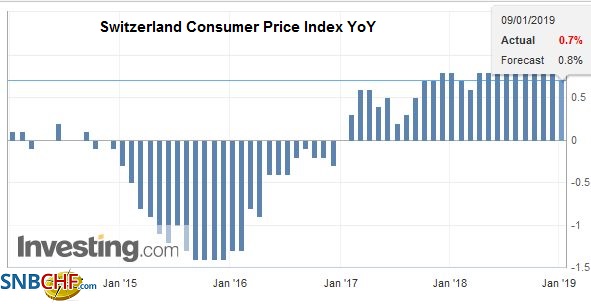09.01.2019 – The consumer price index (CPI) fell by 0.3% in December 2018 compared with the previous month, reaching 101.5 points (December 2015 = 100). Inflation was 0.7% compared with the same month of the previous year. The average annual inflation reached 0.9% in 2018. These are the results of the Federal Statistical Office (FSO). The average annual inflation for 2018 corresponds to the rate of change between the annual average of the CPI for 2018 and that for 2017. The annual average is equal to the arithmetic mean of the 12 monthly indices of the calendar year. The average annual inflation reached 0.9% in 2018. This increase is due in particular to higher prices for petroleum products and increased housing
Topics:
Swiss Statistics considers the following as important: 2) Swiss and European Macro, Featured, newsletter
This could be interesting, too:
Nachrichten Ticker - www.finanzen.ch writes Die Performance der Kryptowährungen in KW 9: Das hat sich bei Bitcoin, Ether & Co. getan
Nachrichten Ticker - www.finanzen.ch writes Wer verbirgt sich hinter der Ethereum-Technologie?
Martin Hartmann writes Eine Analyse nach den Lehren von Milton Friedman
Marc Chandler writes March 2025 Monthly
| 09.01.2019 – The consumer price index (CPI) fell by 0.3% in December 2018 compared with the previous month, reaching 101.5 points (December 2015 = 100). Inflation was 0.7% compared with the same month of the previous year. The average annual inflation reached 0.9% in 2018. These are the results of the Federal Statistical Office (FSO).
The average annual inflation for 2018 corresponds to the rate of change between the annual average of the CPI for 2018 and that for 2017. The annual average is equal to the arithmetic mean of the 12 monthly indices of the calendar year. The average annual inflation reached 0.9% in 2018. This increase is due in particular to higher prices for petroleum products and increased housing rentals. Prices for domestic products increased by 0.4% on average, those for imported products by 2.4%. The average annual inflation reached 0.5% in 2017 and –0.4% in 2016. The 0.3% decrease in the CPI compared with the previous month can be explained by several factors including falling prices for heating oil and fuel. In contrast, prices for overnight stays in hotels and new cars increased. |
Switzerland Consumer Price Index (CPI) YoY, December 2018(see more posts on Switzerland Consumer Price Index, ) Source: investing.com - Click to enlarge |
Download press release: Average annual inflation of 0.9% in 2018
German Text:
| 9.1.2019 – Der Landesindex der Konsumentenpreise (LIK) sank im Dezember 2018 im Vergleich zum Vormonat um 0,3% und erreichte den Stand von 101,5 Punkten (Dezember 2015 = 100). Die Teuerung gegenüber dem Vorjahresmonat betrug 0,7%. 2018 belief sich die durchschnittliche Jahresteuerung auf 0,9%. Dies geht aus den Zahlen des Bundesamtes für Statistik (BFS) hervor.
Die durchschnittliche Jahresteuerung 2018 entspricht der Veränderungsrate zwischen dem Jahresmittel 2018 und dem Jahresmittel 2017. Das Jahresmittel berechnet sich als arithmetischer Durchschnittswert der zwölf Monatsindizes des Kalenderjahres. 2018 betrug die durchschnittliche Jahresteuerung 0,9%. Dieser Anstieg ist insbesondere auf höhere Preise für Erdölprodukte sowie auf gestiegene Wohnungsmieten zurückzuführen. Die Preise der einheimischen Produkte legten durchschnittlich 0,4% zu, während jene der Importgüter um 2,4% stiegen. 2017 hatte die durchschnittliche Jahresteuerung bei 0,5% gelegen, 2016 bei –0,4%. Der Rückgang des LIK um 0,3% im Vergleich zum Vormonat ist auf verschiedene Faktoren zurückzuführen, unter anderem auf die tieferen Preise für Heizöl und Treibstoffe. Gestiegen sind hingegen die Preise für Hotelübernachtungen und jene für Neuwagen. |
Download press release: Durchschnittliche Jahresteuerung von 0,9% im Jahr 2018
Tags: Featured,newsletter


